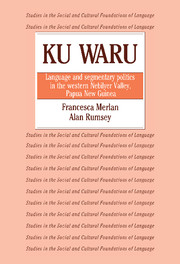Book contents
- Frontmatter
- Contents
- List of illustrations
- List of tables
- List of abbreviations
- Preface and acknowledgments
- 1 Introduction
- 2 The setting
- 3 Some aspects of Ku Waru segmentary sociality
- 4 Ceremonial exchange and marriage in the western Nebilyer Valley
- 5 Some linguistic structures of segmentary politics
- 6 Warfare compensation payment to Laulku: an analysis
- 7 Compensation at Palimung and the Kulka women's club
- 8 The events in perspective
- 9 Perspectives on ‘event’
- Appendix A Transcript of proceedings at Kailge on July 24, 1983
- Appendix B Grammatical sketch of Bo Ung, Ku Waru dialect
- Appendix C The conduct of warfare
- Appendix D Ku Waru metalinguistic expressions
- Chapter notes
- Glossary
- References
- Index
- Plate section
8 - The events in perspective
Published online by Cambridge University Press: 30 December 2009
- Frontmatter
- Contents
- List of illustrations
- List of tables
- List of abbreviations
- Preface and acknowledgments
- 1 Introduction
- 2 The setting
- 3 Some aspects of Ku Waru segmentary sociality
- 4 Ceremonial exchange and marriage in the western Nebilyer Valley
- 5 Some linguistic structures of segmentary politics
- 6 Warfare compensation payment to Laulku: an analysis
- 7 Compensation at Palimung and the Kulka women's club
- 8 The events in perspective
- 9 Perspectives on ‘event’
- Appendix A Transcript of proceedings at Kailge on July 24, 1983
- Appendix B Grammatical sketch of Bo Ung, Ku Waru dialect
- Appendix C The conduct of warfare
- Appendix D Ku Waru metalinguistic expressions
- Chapter notes
- Glossary
- References
- Index
- Plate section
Summary
In Chapters 5, 6 and 7 we have discussed some of the linguistic structures of segmentary politics, and what was done with them at three separate exchange events (in considerably more detail for the first two events than for the third), In this chapter we shall be attempting to draw out some implications of that analysis for the general questions raised in Chapter 1 about wealth exchange transactions. Before we can do that, we must first resume the discussion of segmentary structures and exchange which was opened in Chapter 3. Having now looked in some detail at two exchange events, we are in a position to elaborate upon that discussion in ways that may clarify the relationship between the two spheres (i.e., segmentary structure and exchange). This we will attempt to do in section 8.1, where we will argue that segmentation, exchange, and warfare are alternative moments within a single integrated order of practical/conceptual activity. That ‘traditional’ (bo) order is one which, as the events make clear, is in at least some contexts treated by Ku Waru people as incompatible with the highly valued, newer order of gavman lo and bisnis. In section 8.2., we consider the question of how these two orders are or are not brought into conflict with each other, an issue about which there is more to say in light of the general model developed in section 8.1.
In section 8.3, we return to the more general questions of structure and event to which this book is ultimately addressed. In particular, we re-open the question raised about ceremonial exchange in section 1.2: Who transacts with whom?
- Type
- Chapter
- Information
- Ku WaruLanguage and Segmentary Politics in the Western Nebilyer Valley, Papua New Guinea, pp. 198 - 220Publisher: Cambridge University PressPrint publication year: 1991

